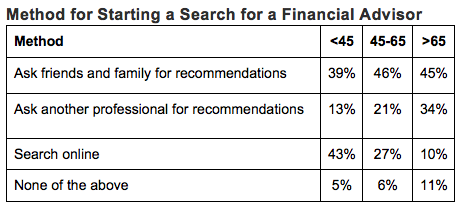Imagine for a moment that you’re an executive at a local company in town. You and your spouse have determined that you need a financial advisor. How do you begin your search?
The answer to this question is pivotal in the world of financial advisor marketing. Why? Knowing how the initial search takes place provides insight into where to focus your marketing efforts.
We decided to ask 403 investors with a minimum of $500,000 this very question in our latest research study. We then segmented respondents into three categories based on age.

The majority of investors in the 45+ category would ask their friends and family for recommendations. This should be no surprise. Word-of-mouth has been the primary search method for decades. It’s why at The Oechsli Institute we work with financial advisors to develop processes around generating more unsolicited referrals, personal introductions, referral alliances and more.
That said, it’s worth noting that in the under-45 category, more investors would start their search online than ask their friends and family for recommendations.
Take that in for a moment. More of them, when faced with a need for a financial advisor, simply pull out their phone and run a quick search than ask their friends and family.
What does this mean? We have to be prepared for a shift. Word-of-mouth won’t become obsolete, but the digital trend will continue. Thinking a few steps ahead, how can you leverage your web presence and social media profiles to achieve some of the same effects of traditional word-of-mouth?
Let’s start with the foundation of why word-of-mouth is so powerful. There’s a trust transfer that takes place when your client tells someone (in so many words), “I’ve experienced this advisor and they’re good.”
In the digital space, there are other ways to build trust and credibility.
- Those with more followers are seen as knowledgeable
- Those who have higher ratings are seen as more trustworthy
- Those who rank higher in Google are seen as more credible
In short, building followers isn’t for your ego. It’s to build trust that you’re a reputable service provider that’s helped a lot of people in the community.
We think most advisors should put way more energy into their digital presence. Not just posting a little more content or dabbling in a few other areas. Really working to become a front-runner in this space. As the under-45 crowd continues to age and build wealth, many will go online to start their search. Will they find you?
Stephen Boswell and Kevin Nichols are partners with The Oechsli Institute, a firm that specializes in research and training for the financial services industry. @StephenBoswell @KevinANichols www.oechsli.com





